Upcoming Events
Upcoming Events will be posted here. Links to recordings for selected past events will appear next to the relevant events after they take place
UNC-Duke Critical Games Symposium II
Friday, 3 November, 12:30-5:00 pm
John Hope Franklin Humanities Institute, Bay 4, C105
Lunch Provided!
The UNC-Duke Critical Games symposium will bring together scholars and artists from UNC and Duke who engage with the critical study and practice of games, both as a medium of expression and as a cultural phenomenon. The emphasis of this gathering is on art, design, culture, and critique. We will also discuss the development and sustainability of game studies and game design within and across our campuses with leaders from our respective campuses.
Presenters will share short presentations on their work, followed by Q/A and group discussion.
Past Events
UNC-Duke Critical Games Symposium
Friday, 24 Feb 2023, 12:30-4:00 pm with games showcase afterwards
OVERVIEW
The UNC-Duke Critical Games symposium will bring together scholars and artists from UNC and Duke who engage with the crit-ical study and practice of games, both as a medium of expression and as a cultural phenomenon. The emphasis of this gathering is on art, design, culture, and critique. We will also discuss the development and sustainability of game studies and game design within and across our campuses with leaders from our respective campuses.
Presenters will share short presentations on their work, followed by Q/A and group discussion.
Virtual Realities, Fictional Worlds and Games Focus Cluster Speakers
Fall 2022
| Mon. 9/5 | Guest Speaker: Muhammad Zafar, Christopher Lunsford | Labor Day: Class in Session
East Duke 209
|
| Mon. 9/12 | Guest Speaker: Joseph Spjut | East Duke 209
|
| Mon. 10/3 | Guest Speaker: Pratheep Paranthaman (Elon University) | East Duke 209
|
| Mon. 10/17 | Guest Speaker: Melanie Swalwell | East Duke 209
|
| Mon. 10/24 | Guest Speaker: Colleen Macklin | East Duke 209
|
| Mon. 11/7 | Guest Speaker: Max Cawley | East Duke 209 |
Dr. Catherine Croft
Guest Speaker for the Foundations of Game Design Class
April 4, 2022 at 5:15PM via Zoom
Dr. Croft is a Duke alumni and CEO of Catlilli Games, a game company that designs games for use in STEM classrooms.
Artists’ Games: Critical and Creative Approaches in New Media Art
25 March 2022 at 4PM Eastern
Online via Zoom
Co-Moderators: Victoria Szabo, Duke University and Joyce Rudinsky, UNC, Chapel Hill

This lightning talk session explores critical and creative approaches to video games in new media art. We are interested in both artists’ sharing their own work and in critical insights on the field, and in engaging from global and diverse perspectives. Historical and contemporary approaches considered, as well as future forecasts. Platform-based, pc, mobile, web, VR, social, hybrid and other formats and modalities welcome as long as they engage in with games as new media art.
- How are artists using games in their practice?
- What prior and current artistic forms, precedents, and analogues do they build upon or change?
- What distinct opportunities (and challenges) do game spaces, formats, technologies, and practices present for graphical and interactive creativity?
- How does the emerging world of artists’ games intersect with that of other media forms?
- How do artists’ games relate to the larger new media art world? Other creative and cultural communities and contexts?
- Where do educational, commercial, and activist games overlap with the worlds of artists’ games?
- Where will artists’ games go in the future?
- How do we/should we exhibit, archive, document artists’ games?
More information on the ACM SIGGRAPH Digital Arts Community Website
See also: https://dac.siggraph.org/sparks-mar2022/ for session video afterwards
Diversity, Equity, Inclusion, and Accessibility Workshop Series: Can I Play That?
November 2021
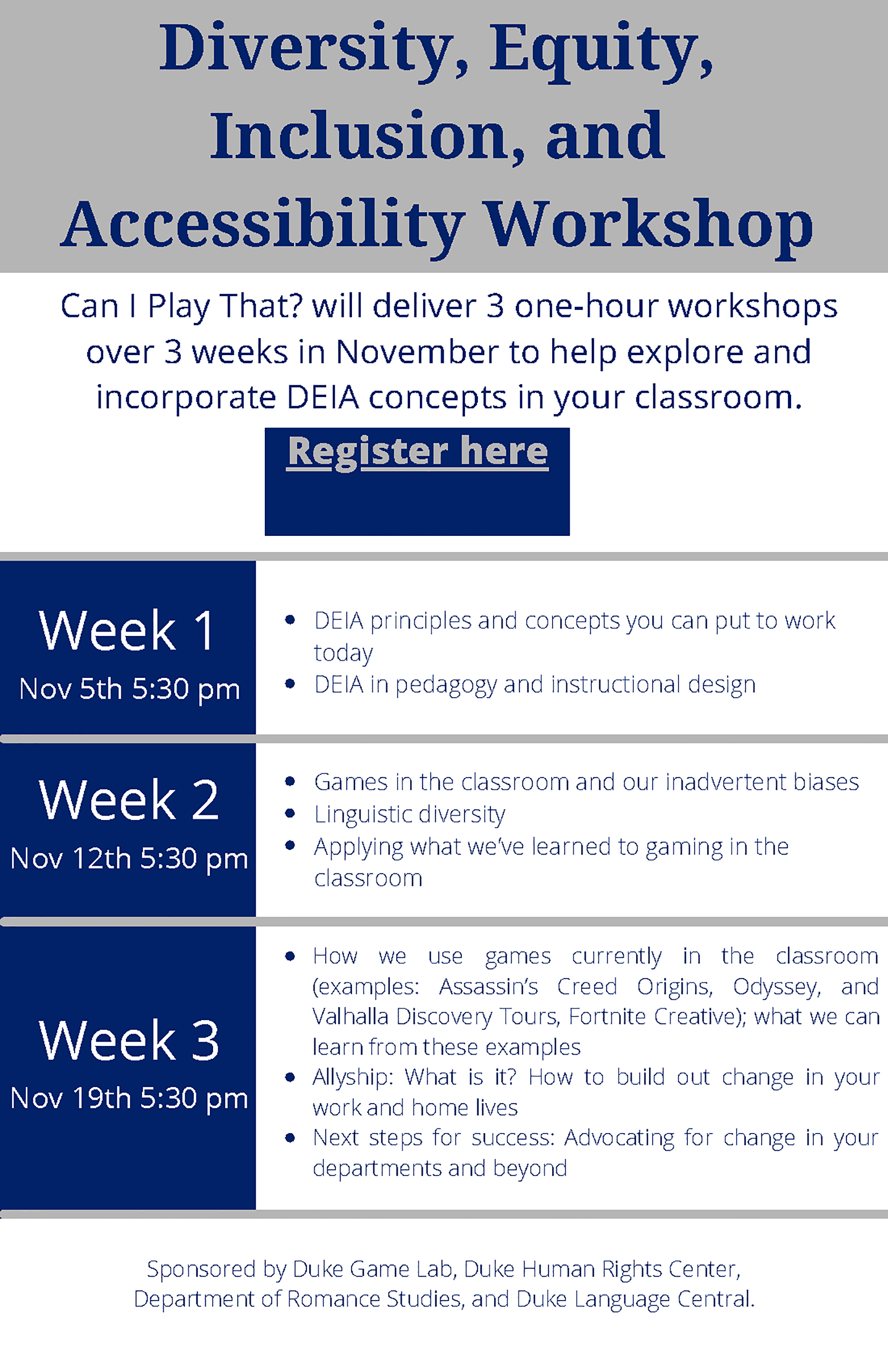
Diversity, Equity, Inclusion, and Accessibility Workshop
Can I Play That? will deliver 3 one-hour workshops over 3 weeks in November to help explore and incorporate DEIA concepts in your classroom.
- Week 1, Nov 5th 5:30 pm
- DEIA principles and concepts you can put to work today
- DEIA in pedagogy and instructional design
- Week 2, Nov 12th 5:30 pm
- Games in the classroom and our inadvertent biases Linguistic diversity
- Applying what we’ve learned to gaming in the classroom
- Week 3, Nov 19th 5:30 pm
- How we use games currently in the classroom (examples: Assassin’s Creed Origins, Odyssey, and Valhalla Discovery Tours, Fortnite Creative); what we can learn from these examples
- Allyship: What is it? How to build out change in your work and home lives
- Next steps for success: Advocating for change in your departments and beyond
Sponsored by Duke Game Lab, Duke Human Rights Center, Department of Romance Studies, and Duke Language Central
Ludic Language Pedagogy: What, How, and Why to Teach with Games
James York, Assistant Professor at Tokyo Denki University (Japan) and Co-Editor of Ludic Language Pedagogy
Monday March 29, 2021, 5 – 6:30 ET
This workshop will ask you to consider your underlying assumptions regarding the value of games as a teaching tool. We will cover: what games exist, their affordances for language teaching, why you should consider teaching with them.
Register for Zoom – PAST EVENT
March 29_Workshop Ludic Language Pedagogy Flyer (PDF)
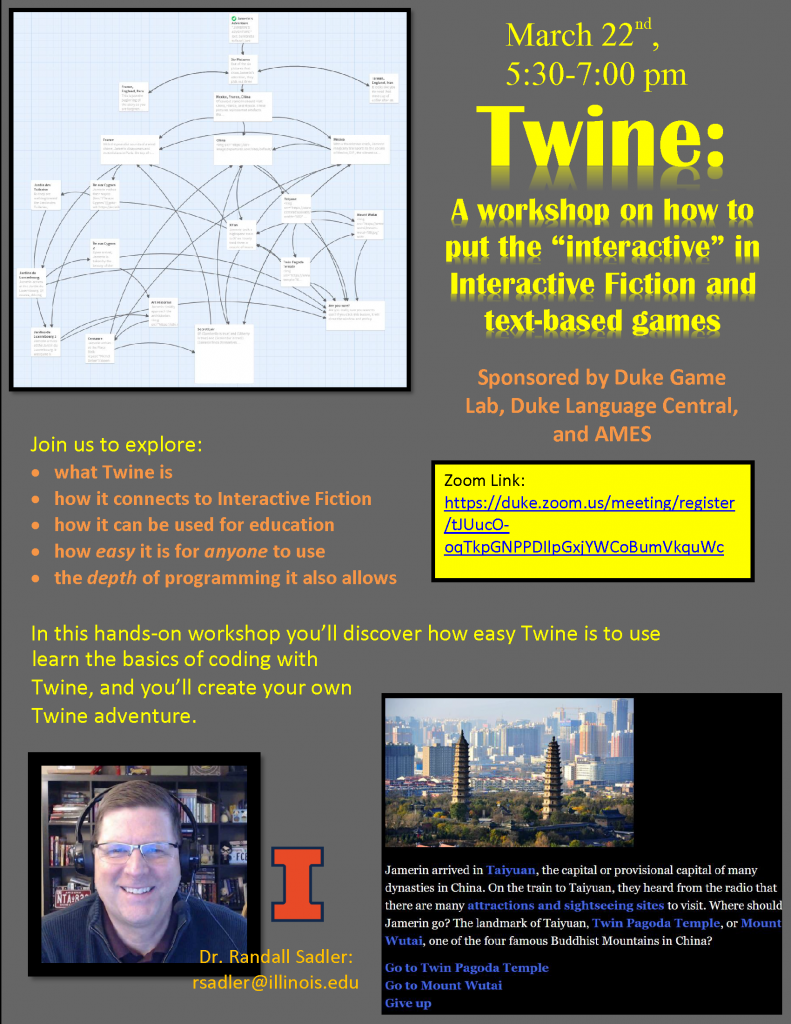
Twine: a workshop on how to put the “interactive” in interactive fiction and text-based games
Dr. Randall Sadler, University of Illinois
March 22, 5:30-7PM EDT
Join us to explore:
- what Twine is
- how it connects to Interactive Fiction
- how it can be used for education
- how easy it is for anyone to use
- the depth of programming it also allows
In this hands-on workshop you’ll discover how easy Twine is to use and learn the basics of coding with Twine, and you’ll create your own Twine adventure.
Register for Zoom – PAST EVENT
Workshop Preview Video
March 22_Twine Workshop Flyer (PDF)
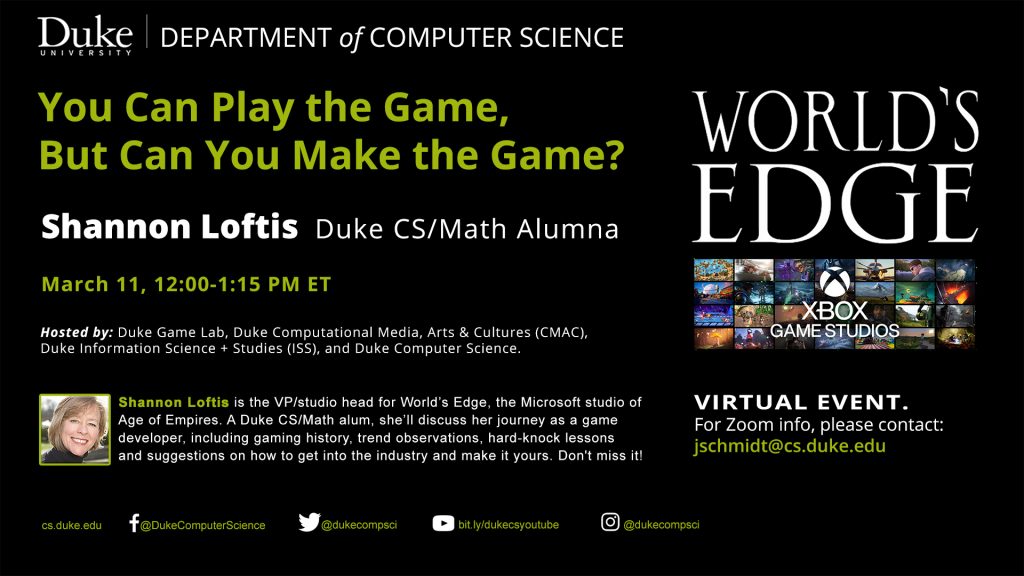
You Can Play the Game,
But Can You Make the Game?
Shannon Loftis
Vice President, World’s Edge Studio, Xbox Games Studios, Microsoft
Thursday, March 11, 2021 12:00 pm – 1:15 pm ET
Contact jschmidt@cs.duke.edu for Zoom link
Hosted by the Duke Game Lab, Duke Computational Media, Arts & Cultures (CMAC), Duke Information Science + Studies (ISS), and the Duke Department of Computer Science
Distinguished Duke Computer Science Alumni Lecture
Game development is one of the most multifunctional industries in the world, and it’s growing more rapidly than any other form of consumer entertainment. From concept to sunset, any given game may require the skills of coders, artists, musicians, actors, writers, designers, producers, IT, operations, customer service, technical support, and, yes, marketers. Game team sizes range from 1 to thousands. Total gaming audience size will exceed 2 billion unique people this year, and global revenue is predicted to exceed $200b by 2023.
Why, though? What is it about screen-based games that attracts people, and how did we get here? Where might we go, and how can you join?
Loftis will discuss her 25+ year journey as a game developer, including a bit of gaming history, trend observations, hard-knock lessons and suggestions for ways to get into the industry and make it yours.
Shannon Loftis
Short Biography
Shannon Loftis is the VP/studio head for World’s Edge, the Microsoft studio dedicated to all things Age of Empires. Shannon has been with Microsoft since 1993, making games for the vast majority of that time. Loftis has been credited with contributions to more than 50 games, platforms and devices, ranging from Solitaire by Microsoft to Kinect Adventures to Tell Me Why and Flight Simulator: 2020 edition, as well as all current Age of Empires games. Loftis co-founded the industry-wide Women in Games organization in 1999. Currently, Loftis also serves on the boards of directors for the Academy of Interactive Arts & Sciences (AIAS) and the International Game Developers Association Foundation (IGDAF).
Visit https://www.cs.duke.edu/events for more information about upcoming Duke CS events.

School is a Game…But is it a Good Game? with Barry J. Fishman
Thursday, October 22, 2020 4-6PM
In this talk, Dr. Fishman discusses the deep-seated problems with traditional grading systems, and proposes an approach called gameful learning as a solution that supports deep engagement.
Contact: Yan Liu (yl286@duke.edu)
Join Zoom Meeting
https://duke.zoom.us/j/95401957664?pwd=aVg0a2p0dGRGYVBaUDNUTWZjSjdnUT09
Meeting ID: 954 0195 7664
Passcode: 042660
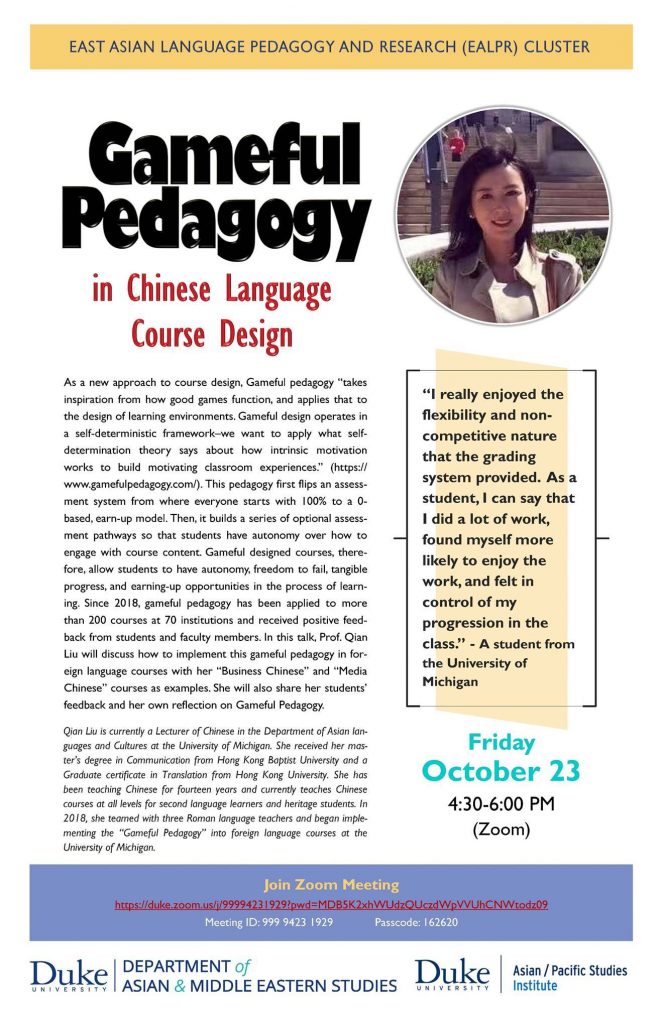
Gameful Pedagogy in Chinese Language Course Design with Qian Liu
Friday, October 23, 2020, 4:30-6PM
Gameful pedagogy “takes inspiration from how good games function, and applies that to the design of learning environments. In this talk, Prof. Qian Liu will discuss how to implement gameful pedagogy in foreign language courses.
Join Zoom Meeting
https://duke.zoom.us/j/99994231929?pwd=MDB5K2xhWUdzQUczdWpVVUhCNWtodz09
Meeting ID: 999 9423 1929 Passcode: 162620

Introduction to National Security: Wargaming with Sebastian J. Bae
Tuesday, October 27, 2020, 10:15-11:30AM
The lecture will introduce students to professional wargaming in the national security field. From ancient to
modern wargames, the lecture will briefly discuss the history and evolution of wargaming as a discipline. The focus of the lecture will examine the purposes, the taxonomy, and strengths and weaknesses of both analytical and educational wargames in the national security field.
Join Zoom Meeting:
https://duke.zoom.us/j/91428237013?pwd=aWtKSUNIb0dZVVdjQzlWWS9Fa3VXQT09
Meeting ID: 914 2823 7013 Passcode: 407088

Virtual Spaces Beyond Zoom with Enrique Cachafeiro
Friday, October 30, 2020 5-6PM
Zoom and other web conferencing tools are the backbone of online, synchronous teaching, However there are in-person experiences that cannot be reproduced in a 2D software. In virtual reality environments such as AltSpaceVR and FrameVR.io users can view and interact with 3D virtual objects such a molecule or equipment. Participants in virtual presentations have avatars that can interact with each other or walk around a gallery to view projects. Enrique Cachafeiro, from the Duke Occupational Health and Safety Office, has used virtual environments for education and training for several years. He will discuss ways VR spaces can be used in teaching, meetings, and training. For registration: https://duke.libcal.com/event/7211211

Changing the Game with Omari Akil
Thursday, September 24, 2020 10:15-11:30 AM on Zoom
Omari Akil will describe the challenges of leaving the tech industry and and starting Board Game Brothas, one of the few Black owned hobby board game publishing companies in the country. He explains the motivation behind designing and producing games like Rap Godz, which focus on Black Culture yet require no knowledge or understanding of the source material in order to have a fun and engaging experience while playing. He will also touch on the racial tensions in the United States and how they have impacted the hobby board game industry.
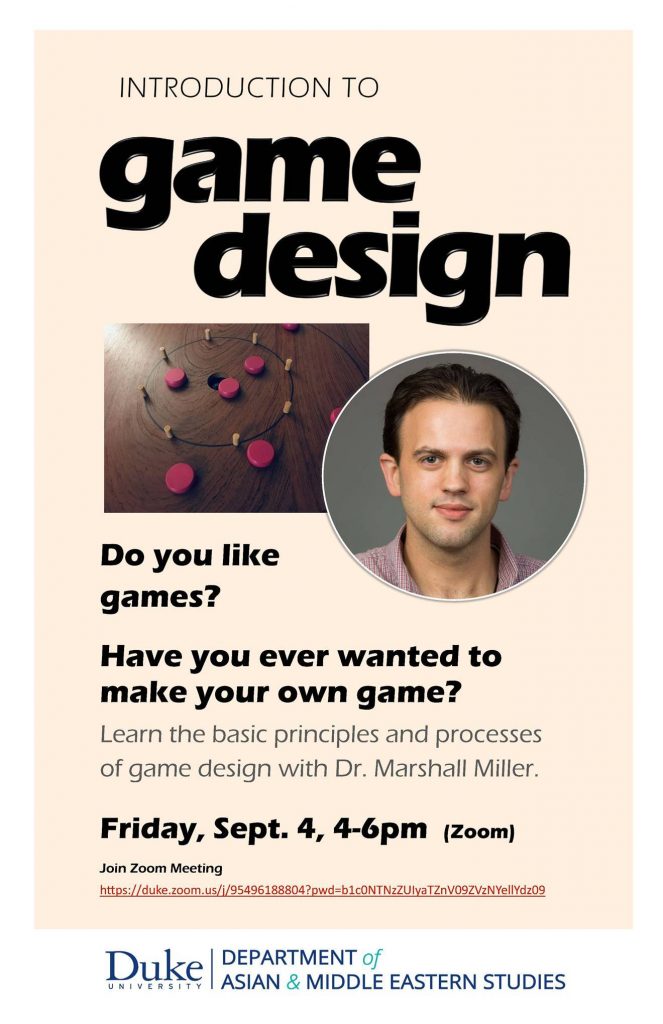
Introduction to Game Design with Marshall Miller
Friday, September 4, 2020, 4-6PM on Zoom
Do you like games? Have you ever wanted to make your own game? Learn the basic principles and processes of game design with Dr. Marshall Miller.
https://duke.zoom.us/j/95496188804?pwd=b1c0NTNzZUIyaTZnV09ZVzNYellYdz09
Global Game Jam (January 31 – February 2, 2020)
The Game Lab is hosting a site of the Global Game Jam! Participants make analog and digital games in collaborative teams over a whirl wind 48 hours. Last year over 800 sites participated around the world and produced thousands of games together on a secret shared theme. No previous design or technical experience required but we are hosting a series of workshops in preparation if you want to get your feet wet!
For more information check out the GGJ . Registration opens on November and seats are limited so make sure to join the Game Lab listserv for updates!
 Game Night: Games from around the World
Game Night: Games from around the World
Friday, November 15, 2019
6:00 pm – 10:30 pm
Link Classrooms 5 & 6
Come join us as we play cultural board games from around the World.
In addition to board games and video games, we will hold our first Just Dance-a-Thon in the Game Lab!
Food & drinks will be served in Link 5.
 Game Night: Gaming & Empire
Game Night: Gaming & Empire
Friday, October 11th, 2019
6:00 PM – 10:30 PM
Link Classrooms 5 and 6
From Risk to Civilization, many extremely popular and long-running games have focused on the questions of an empire. Even games that do not revolve around a military force, such as Settlers of Catan, take up settler colonialism in a scramble for land. While many of these games are about building and maintaining an empire
— both through martial and cultural means — there have been recent attempts
from creators to push back on the straightforward narratives like those of Risk,
Civilization, and Catan. Games such as Spirit Island or Root, in fact, could be
characterized as anti-colonial, but do these games do enough work?
- What can we learn from playing games that — at least on the surface —
reinforce imperialism? - Why are these narratives so popular?
- What does it mean to play at building an empire?
Come play games that think about civilization, settler colonialism, military
strategy, and other representations of an empire.
Food & drinks will be served in Link 5.

Design Workshop Series (multiple dates)
Do you have a great idea for a game but don’t know where to get started? Do you want to get together and create with like-minded gamers at Duke? Do you want to prepare for the Global Game Jam? The Duke Game Lab is hosting a series of design workshops to do just that! You are welcome to attend just one or all, each workshop stands alone but will allow you to practice skills gained from previous experience. So come learn game design with us! See flyer for more details.
Principles of Game Design (10/24/19, 4:00 – 7:00pm*)
Create and playtest simple games with game dev. + host of the 200 word RPG Challenge, Dr. Marshall Miller!
Introduction to Twine (11/12/19, 11:30-2:30pm*)
Use free and open source software to create video games. Outline and test more complex designs too!
Table Top RPG Narrative Design (11/21/19, 4:00-7:00pm*)
Build compelling story arcs for games like Dungeons and Dragons and Pathfinder with an experienced DM!
*The workshop will take place during the first two hours followed by 1 hour of lab time for students that wish to consult with instructors or continue working on a project.
Co-sponsored by the Duke Game Lab, the Games and Culture Lab, and Learning Innovation. Please contact Katya Gorecki (kg134@duke.edu) with any questions.
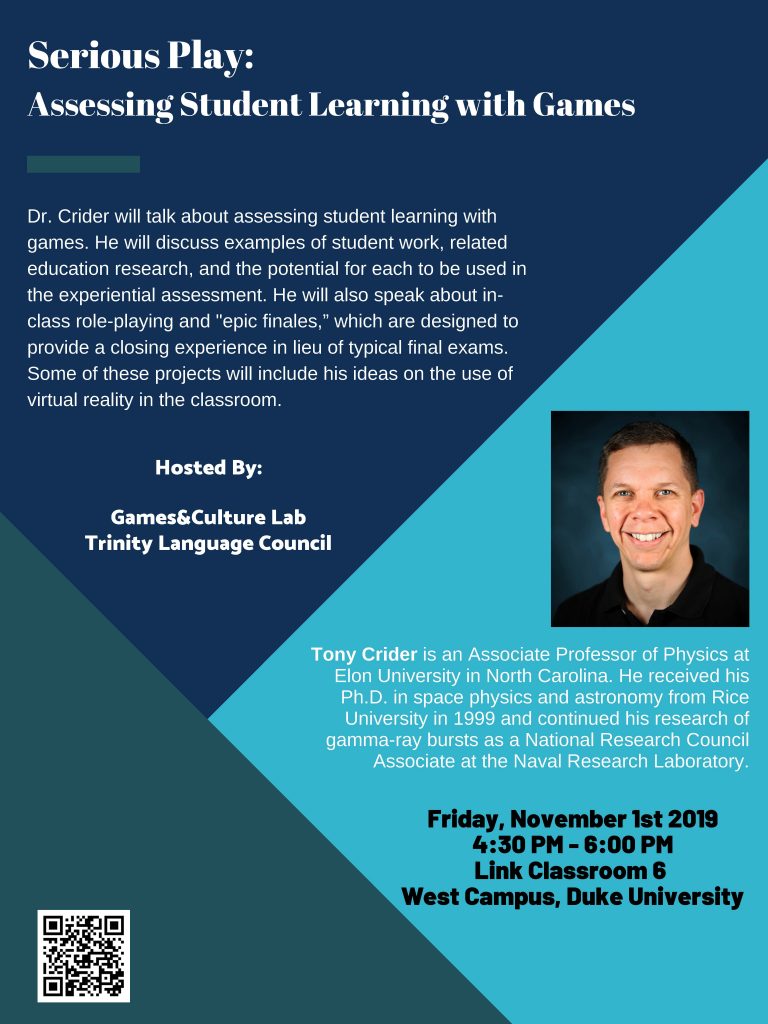
Serious Play: Assessing Student Learning with Games
Friday, November 1st, 2019
4:30 PM – 6:00 PM
Link Classroom 6
Dr. Crider will talk about assessing student learning with games. He will discuss examples of student work, related education research, and the potential for each to be used in the experiential assessment. He will also speak about in-class role-playing and “epic finales,” which are designed to provide a closing experience in lieu of typical final exams. Some of these projects will include his ideas on the use of
virtual reality in the classroom.
Tony Crider is an Associate Professor of Physics at Elon University in North Carolina. He received his Ph.D. in space physics and astronomy from Rice University in 1999 and continued his research of gamma-ray bursts as a National Research Council Associate at the Naval Research Laboratory.
 Gamefulness: A Framework for Language Learning & Teaching with Jonathon Reinhardt
Gamefulness: A Framework for Language Learning & Teaching with Jonathon Reinhardt
Friday, October 25th 2019
4:30 PM – 6:00 PM
Link Classroom 6
As language teachers increasingly recognize that digital games motivate learners, scholars argue that some games incorporate mechanics that offer noteworthy affordances, or opportunities, for language learning (Gee, 2007; Sykes & Reinhardt, 2012; Reinhardt, 2019). However, not all games are designed equally, and employing games in the language classroom effectively requires knowing which ones might be well-suited and why, how they might be adapted and supplemented for formal instruction, and how learner gaming experiences and dispositions towards “gameful” learning play a role in their reception. How can digital games be used for the very serious activity of language learning? Insight comes from research on gameful teaching and learning as well as from analysis of “learnable” L2 gaming practices in the Internet wilds. Grounded in these insights, this talk will present a framework of “gamefulness” for the design, evaluation, and implementation of digital games for language learning and teaching.
Jonathon Reinhardt, Ph.D. (Penn State) is Associate Professor of English, Applied Linguistics and Second Language Acquisition and Teaching at the University of Arizona. His research centers on the relationships between the theories and practices of technology and computer-assisted language learning (CALL) and teaching, especially with emergent technologies like social media and digital gaming. He is the author of “Gameful Second and Foreign Language Teaching and Learning” (2019, Palgrave-Macmillan) and is the current president of CALICO, Computer-Assisted Language Instruction Consortium.
 Amazon Sumerian: Basics of Amazon Sumerian
Amazon Sumerian: Basics of Amazon Sumerian
Thursday, November 7, 2019
1:30 – 2:30 PM
Link Classroom 6
Amazon Sumerian is a new development platform for games and VR/AR. Built on A-frame and native to WebVR, Amazon Sumerian runs in a browser, with no downloads, and creates experiences that are published directly to the web. These experiences are device agnostic and can run on mobile devices, tablets, PCs, Macs, and all VR HMDs. The platform is tailored for non-programmers and offers an easy and intuitive interface. Come to an introductory workshop where you can learn the basics of Sumerian!
Hosted by Duke GameLab & Games and Culture Lab.
To participate, make an account at aws.amazon.com.
Gamification for the Foreign Language Classroom
September 26th, 2019
4:00pm
Link Classroom 6
A workshop on gamification theory and practical applications of incorporating digital and analogue games into your courses.
For more information, contact Eileen Anderson eileen.anderson@duke.edu.
To register: https://forms.gle/fioDgCEK2wyU7UhLA.
 Game Lab Open House + Game Night
Game Lab Open House + Game Night
September 13th, 2019
6:00pm- 11:30pm
Link Classrooms 5 & 6
In collaboration with the Center for Multicultural Affairs, Asian American Studies, & Rubenstein Libraries.
Let’s play with power & games!
Come play games with your favorite heroes, villains, vixens, and sidekicks, to diverse cultural representations good, bad, and the weird.
Updates on exciting programs and opportunities. Bring your own games that play with power and get under your skin(s). Cosplay welcome!
Game Design Camp
June 14th – 28th, 2019
8:00am – 5:00pm
Link Classrooms 6
Participants in this camp will learn basic coding skills to design video games using Maya and 3ds Max software. In addition, campers will learn how Maya software can be used to enhance their presentation skills for class projects. Working independently and in teams, campers will sharpen their skills in planning, problem- solving, collaboration and programming. On the final day of camp, campers will share their final project with the class.
 Game Night: War, Peace, & Strategy Games
Game Night: War, Peace, & Strategy Games
April 19, 2019
6:00pm – 11:00pm
Link Classrooms 5 and 6
Come join us at our last Game Night for the Spring Semester, as we play and explore exciting games!!!
War games: Moral Conflict, Paths of Glory, A Game of Thrones, Risk, and, Small World.
Abstract strategy games: Chess, Checkers, Go, Tak, Chinese Checkers, and Mahjong.
Negotiation games: Diplomacy and Intrigue.
The League of Legends and Super Smash Bros. Tournament, will take place in Link Classroom 6.
Gamification for the Foreign Language Classroom (presented by Enrique Cachafeiro, Luis Navarro, and Eileen Anderson)
April 6, 2019
10:00am – 1:00pm
Languages 114
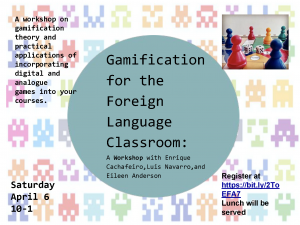 A workshop on gamification theory and practical applications of incorporating digital an analogue games into your courses.
A workshop on gamification theory and practical applications of incorporating digital an analogue games into your courses.
Design + Code + Culture = Play Bonne Chance
March 28, 2019
4:00pm – 6:00pm
Link Classroom 6
 Learning languages through or with gaming are not new in and of itself. What makes the “Bonne Chance” project unique is that we are trying to teach French through designing a game instead of simply playing it. Through an interdisciplinary approach to modern software development, students from multiple academic backgrounds with varying experience levels are able to work together in a cross-functional community. Language and culture immersion is being explored in a new technological and educational realm by applying game-based learning mechanics to an elementary French language curriculum.
Learning languages through or with gaming are not new in and of itself. What makes the “Bonne Chance” project unique is that we are trying to teach French through designing a game instead of simply playing it. Through an interdisciplinary approach to modern software development, students from multiple academic backgrounds with varying experience levels are able to work together in a cross-functional community. Language and culture immersion is being explored in a new technological and educational realm by applying game-based learning mechanics to an elementary French language curriculum.
Cary Staples, Sebastien Dubreil and their students from “The App Farm”will discuss the project of the game.
“On the surface, the union of the humanities and video games might seem odd, the former focused on thoughtful reflection, context and contingencies, and the latter on reflex, immediacy and instantaneous feedback. In practice, however, this union is increasingly proving to be an enormously profound one, with games providing a platform for more experiential ways of engaging history, literature, philosophy, and even religion.” (Humanities Arcade, 2016)
I Am Game: The Mechanics of Undesirability in the Video Game Papers, Please
March 27, 2019
4:00pm – 5:30pm
Rubinstein Library 349
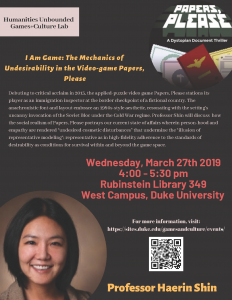 Debuting to critical acclaim in 2013, the applied-puzzle video game Papers, Please stations its player as an immigration inspector at the border checkpoint of a fictional country. The anachronistic font and layout embrace a 1980s-style aesthetic, resonating with the setting’s uncanny invocation of the Soviet Bloc under the Cold War regime. Professor Shin will discuss how the social realism of Papers, Please portrays our current state of affairs wherein person-hood and empathy are rendered “undesired cosmetic disturbances” that undermine the “illusion of representative modeling”; representative as in high-fidelity adherence to the standards of desirability as conditions for survival within and beyond the game space.
Debuting to critical acclaim in 2013, the applied-puzzle video game Papers, Please stations its player as an immigration inspector at the border checkpoint of a fictional country. The anachronistic font and layout embrace a 1980s-style aesthetic, resonating with the setting’s uncanny invocation of the Soviet Bloc under the Cold War regime. Professor Shin will discuss how the social realism of Papers, Please portrays our current state of affairs wherein person-hood and empathy are rendered “undesired cosmetic disturbances” that undermine the “illusion of representative modeling”; representative as in high-fidelity adherence to the standards of desirability as conditions for survival within and beyond the game space.
From Gamification to Gameful Learning
March 25, 2019
1:00pm
American Tobacco Campus Strickland Building, 3rd Floor
 Dr. Rachel Niemer is Director of Strategic Initiatives in the Office of Academic Innovation at the University of Michigan. She coordinates the Product Management, Public Engagement, and Behavioral Science teams in their work as thought-partners with faculty. Dr. Niemer helps establish the vision for designing new and engaging learning environments using best practices from industry paired with findings from the learning and motivational sciences. Prior to joining the Academic Innovation team, Rachel served as the Assistant Director at the Center for Research on Learning and Teaching at Michigan.
Dr. Rachel Niemer is Director of Strategic Initiatives in the Office of Academic Innovation at the University of Michigan. She coordinates the Product Management, Public Engagement, and Behavioral Science teams in their work as thought-partners with faculty. Dr. Niemer helps establish the vision for designing new and engaging learning environments using best practices from industry paired with findings from the learning and motivational sciences. Prior to joining the Academic Innovation team, Rachel served as the Assistant Director at the Center for Research on Learning and Teaching at Michigan.
Game Night: Cultural Games
February 22, 2019
7:00pm – 11:00pm
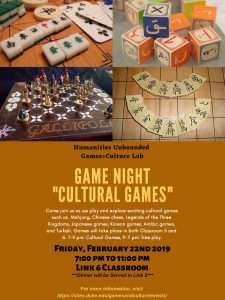
This game night will feature a selection of cultural games from around the world curated by Duke faculty. Faculty members will be on-hand to share and teach the games of their home cultures. Join us as we traverse continents in the world of gaming. Dinner will be served.
The Best and Worst Biology in Video Games (or at least the ones I’ve played)
January 25, 2019
7:00pm – 7:45pm
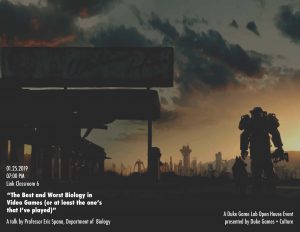
Eric Spana explains the unusual and fantastic occurrences in science fiction, fantasy and video games using the biological mechanisms already identified on Earth while pointing out the really, really bad science, too.
What Remains of Edith Finch: An Exploration of Walking Simulators
January 25, 2019
5:00pm – 6:30pm
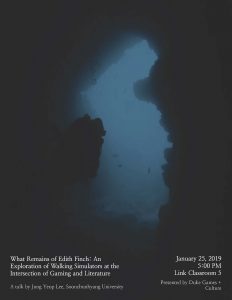
Video games have coexisted with furious action, violence and thrill. It is not common to consider the aesthetics of contemplation of the sublime landscape of Los Santos of Grand Theft Auto V. However, the Walking Simulator genre simultaneously reduces the interaction between the player and the game, and limits the user’s intervention space to the epic selection, while simultaneously pursuing the aesthetics of the contemplation and the fun of the puzzle. Through the analysis of the award-winning game What Remains of Edith Finch this talk dives into the contemplative world of games and the aesthetics of the walking simulator. Dinner to follow.
“Program and Control”? Netflix’s Bandersnatch and the Future of Choose Your Own Adventure with Anastasia Salter
January 24, 2019
5:30pm – 7:00pm
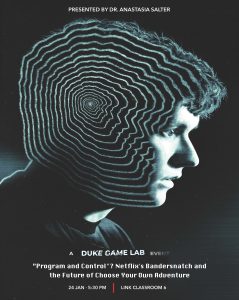
Netflix’s new playable film, Black Mirror: Bandersnatch, has drawn renewed attention to the potential for mainstreaming interactive fiction. Taking place as it does among the dystopian, tech-wary episodic sequences of Black Mirror, the work is simultaneously an experiment to gauge audience acceptance and a commentary on the potential future of user-aware, data-gathering playable experiences as an accepted part of “watching”–and being watched. However, placing Bandersnatch into conversation with the history of games and interactive fiction is mostly a testament to how far we haven’t come: the combination of 80s nostalgia, trite “bad” endings, forced metafiction, and an elevation of the game designer as auteur is fundamentally disappointing. What can we learn from the responses of non-gamers and a broader community to Bandersnatch’s experiment, and where might interactive film go from here?
Game Night: BIG Games
November 9, 2018
7:00pm – 9:00pm
Bostock 127
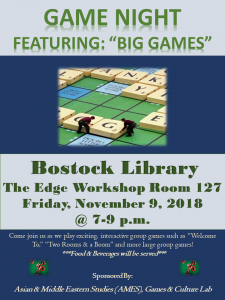
Come join us as we play large-group games such as Welcome To, Two Rooms & a Boom, others! Invite your friends! Dinner will be served.
Game Night
October 19, 2018
7:00pm – 9:00pm
Bostock 127
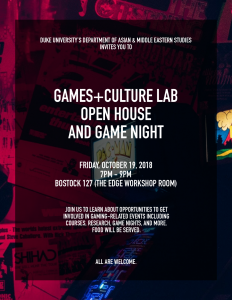
Duke Games and Culture, a Humanities Unbounded Collaborative Project in Asian and Middle Eastern Studies, invites you to our inaugural game night and information session where all involved faculty will introduce the University community to the many opportunities to get involved with Games and Culture on campus!



